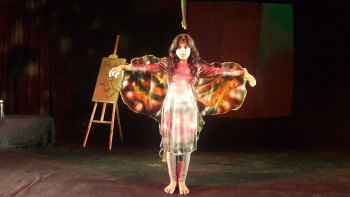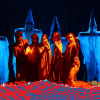A theatrical triumph in East London: 'Prithok Palonko' mesmerises a packed house

The Brady Arts Centre in East London witnessed a cultural extravaganza as the curtains rose for "Prithok Palonko" (A Palanquin of One's Own), a production by Bishwo Shahitto Kendro, UK, staged on November 25, Saturday. This theatrical gem, written by Bulbul Hasan and directed by Syeda Saima Ahmed, is part of the much-anticipated 'A Season of Bangla Drama', an annual festival organised by the Tower Hamlets Council. The play wove a tapestry of love, poetry, and timeless connections, leaving the audience in awe.
The hall was packed to capacity, and the atmosphere crackled with anticipation as the audience settled in for a journey through the lives of iconic poets and the profound impact of their relationships. The captivating performance by the cast, led by Bulbul Hasan as Abul Hasan, Syeda Saima Ahmed as Suraiya Khanum, Mark Foulds as Ted Hughes, Deborah Pike as Sylvia Plath, and San Razzaque Badhon as Nirmolendu Goon, transported the viewers to different eras and emotions.

The parallel storytelling beautifully unfolded, portraying the intertwining lives of Abul Hasan and Suraiya Khanum in the mid-1970s alongside the captivating narrative of Ted Hughes and Sylvia Plath in the mid-1950s. The skilful weaving of these parallel narratives added an extra layer of depth and resonance, enhancing the overall impact of the theatrical experience.
The overwhelming response from the audience echoed the success of the production. Every seat was claimed, and spectators were treated to a visual and emotional feast that unfolded on the stage of the Brady Arts Centre. The electrifying chemistry between the actors and the seamless transitions between acts left the audience on the edge of their seats.

Eminent British-Bangladeshi poet Shamim Azad, who graced the event, showered praise on the production, stating, "The play successfully captures the essence of our era, resonates with the voices of our poets, and delves into the profound richness of Abul Hasan's literary legacy." Shamim Azad's commendation underscored the play's ability to resonate with contemporary audiences while honouring the literary traditions that have shaped the Bangladeshi cultural landscape.

Syed Badrul Ahsan, a distinguished newspaper editor and writer, added his voice to the chorus of appreciation. Having been a student of Suraiya Khanum at Dhaka University's English department in the 1970s, Ahsan remarked, "All the characters are portrayed beautifully, particularly Suraiya Khanum's. I went back to the mid-1970s." Ahsan's nostalgic journey through time highlighted the play's authenticity in capturing the essence of its characters and their historical context.
As the final curtain descended, leaving the audience in a state of reverie, "Prithok Palonko" not only achieved the status of a theatrical triumph but also solidified the production as a testament to the power of storytelling and the universal appeal of the human experience. The echoes of applause, the standing ovation, and the lingering conversations amongst attendees showcased the play's profound impact and the power of live theatre to transcend time and connect hearts across generations.

 For all latest news, follow The Daily Star's Google News channel.
For all latest news, follow The Daily Star's Google News channel. 








Comments